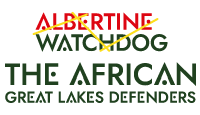Increasing Pressure on Forest Peoples of the Democratic Republic of Congo

With about 107 million hectares of moist forest, the Democratic Republic of Congo (DRC) is a perfect paradox of natural resources endowed country caught in repeated economic and socio-political crises.
The Democratic Republic of Congo possesses about 60% of the Congo basin’s forest on which the majority of its people rely for their survival.
Deforestation and forest degradation have increased in the Democratic Republic of Congo (DRC) despite the government’s commitment to safeguarding its forests. Commercial and industrial-scale activities represent major direct long-term threats to the forests. By contrast, the traditional livelihood strategies of indigenous and local communities show a capacity to coexist with forests sustainably.
The main direct causes of deforestation and forest degradation in the DRC are illegal industrial and so-called ‘artisanal’ logging, unsustainable mining, commercial agriculture, and urban demand for fuelwood. Roadbuilding, hydroelectricity infrastructure development and anticipated expansion of oil palm cultivation and ‘agro-industrial parks’ are emerging threats. Underlying causes include insecure community land rights, deficiencies, and contradictions in the legal framework, obstacles to forest communities’ securing legal remedy for rights violations, weak forest governance, and law enforcement, non-compliance, corruption, and the role of international markets and unsustainable trade flows.
Forest destruction impacts negatively on forest peoples via a range of rights violations, starting with a failure to consult communities on decisions that affect them. Harms experienced include loss of natural resources relied on for food, medicine, and building materials; water pollution; denial of access to traditional and sacred sites; forced expulsion; harassment and arbitrary arrest of those who protest against or resist deforestation; physical attacks, rape, torture and death in police custody.
Land tenure has evolved in the DRC without formal recognition of communities’ customary ownership rights over forest lands they have occupied and used for generations, although traditional practices remain widespread. Reforms have left governance gaps, inconsistencies and ambiguities in the regulation of commercial and artisanal forest activities, and in safeguarding community rights, that urgently need resolution.
Towards the end of 2019, major illegal logging operation was halted by the Democratic Republic of Congo’s (DRC’s) government following monitoring by local non-governmental organisations and multiple complaints by forest communities.
The DRC environment minister, on Friday (29th November 2019), instructed the governor of the Tshopo Province to suspend the logging permit of the Chinese-owned FODECO in Basoko Territory following reports from local communities, alongside other communities in Equateur Province, who have received training in monitoring and the detection of illegalities from Rainforest Foundation UK (RFUK) and local partner organisation, GASHE
Civil society group SOCIPEQ wrote a letter to DRC’s Minister for Environment and Sustainable Development, to call on him to enforce the forestry laws across the country, drawing, in particular, his attention to the situation of the Equateur province where severe illegalities have been reported.
Joseph Bolongo, from GASHE, said
“The Minister should avoid ‘double standards’. The illegalities committed by FODECO have not been as extensively documented as those committed by other companies such as Maniema Union 2, now known as Long Xin, in Equateur Province. Time has come for national authorities to put an end to this anarchy which has been documented and condemned by civil society for a long time now.”
“This is a positive step in the right direction but much wider efforts are needed to tackle deeply rooted governance problems and outright corruption across DRC’s logging industry,” said Ms Osuna Orozco.
”The international community needs to understand that these illegalities are likely to massively increase if the timber industry is granted wider access to DRC’s rainforests,” she concluded.
[1] Forestière pour le Développement du Congo (FODECO).
[2] Supported by the UK Department for International Development.
[3] GASHE (Groupe d’action pour sauver l’homme et son environnement), RFUK’s local partner, is located in Mbandaka, Equateur Province, DRC. The charity aims to protect the environment and its resources whilst encouraging human development of those who live there, such as forest and indigenous communities. We have worked with GASHE since 2012 on issues such as community forestry, real-time forest monitoring and sustainable conservation.
[4] Société Civile de la Province de l’Équateur. The mission of SOCIPEQ is to represent the population in fighting for the improvement of governance in the DRC for a harmonious and inclusive development.
[5] Letter
Photo credit: Rain Fores Foundation UK
